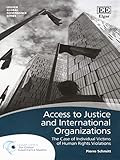Access to justice and international organizations : The case of individual victims of human rights violations / Pierre Schmitt, Legal Secretary at the General Court of the European Union, and Associate Fellow at the Leuven Centre for Global Governance Studies, KU Leuven, Belgium.
Series: Leuven global governancePublisher: Cheltenham, UK : Edward Elgar Publishing, [2017]Copyright date: ©2017Description: xxix, 370 pages ; 25 cmContent type:- text
- unmediated
- volume
- 9781786432889 (cased)
- 1786432889 (cased)
- Human rights
- International agencies
- Non-governmental organizations
- International law and human rights
- Non-state actors (International relations)
- Liability for human rights violations
- Human rights
- International agencies
- International law and human rights
- Liability for human rights violations
- Non-governmental organizations
- Non-state actors (International relations)
- Internationale Gerichtsbarkeit
- Internationale Organisation
- Menschenrechtsverletzung
- Tribunal
- Droits de l'homme
- Organisations internationales
- Organisations non gouvernementales
- Violation des droits de l'homme
- 341.48 SCH 23
- KZ1266 .S36 2017
| Item type | Current library | Collection | Call number | Status | Date due | Barcode |
|---|---|---|---|---|---|---|
 BOOKs
BOOKs
|
National Law School | Reference | 341.48 SCH (Browse shelf(Opens below)) | Available | 36359 |
Browsing National Law School shelves, Collection: Reference Close shelf browser (Hides shelf browser)
Includes bibliographical references (pages 340-355) and index.
Contents:
1. Setting the scene;
2. International organizations’ human rights obligations;
3. Right of access to justice;
4. International dispute settlement mechanisms;
5. National jurisdictions and the immunities of international organizations;
6. General conclusions and normative proposals;
Index
This groundbreaking book offers a compelling articulation of the right of access to justice for individuals facing human rights violations by international organizations. Following an examination of the human rights obligations of a variety of international organizations, the author scrutinizes their dispute settlement mechanisms as well as the conflict between their immunities and the right of access to justice before national jurisdictions. Highlighting recent examples, such as the cholera outbreak in Haiti, this book reveals how individual victims of human rights violations by international organizations are frequently left in the cold, due to the lack of an independent, impartial dispute settlement mechanism before which they can file such claims. Considering both global mechanisms and current mechanisms established by international organizations such as administrative jurisdictions for employment-related disputes, Pierre Schmitt finds that they either are not competent or that they have a limited scope. He concludes by offering normative proposals addressed both to international organizations and to national judges confronted with such cases. Offering a wealth of empirical and practical wisdom, this book will appeal to scholars in public international law and human rights. It is also a must-read for practitioners, judges and legal advisers working in the field and will prove a useful tool for national authorities negotiating immunity conventions with international organizations --Back cover.








There are no comments on this title.